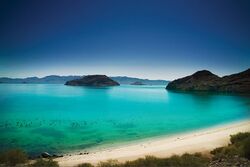Sea of Velar: Difference between revisions
No edit summary |
mNo edit summary |
||
| Line 41: | Line 41: | ||
==Geography== | ==Geography== | ||
[[File:Gar Ersa'i, Adazakh.jpg|thumb|left|250px|Islands in | [[File:Gar Ersa'i, Adazakh.jpg|thumb|left|250px|Islands in the [[Bay of Ersa]], [[Adazakh]]]] | ||
===Coastal countries=== | ===Coastal countries=== | ||
Revision as of 04:39, 30 January 2023
This article is incomplete because it is pending further input from participants, or it is a work-in-progress by one author. Please comment on this article's talk page to share your input, comments and questions. Note: To contribute to this article, you may need to seek help from the author(s) of this page. |
| Sea of Velar | |
|---|---|
| File:Sea of Velar.png | |
| Location | Teudallum, western Astyria |
| Type | Sea |
| Primary outflows | Straits of Jajich |
| Basin countries | Andamonia, Dangish Empire, Heideland, Isles of Velar, Trellin, Txekrikar |
| Surface area | 734,125 square kilometres (283,447 sq mi) |
| Shore length1 | 11,272.5 kilometres (7,004.4 mi) |
| Islands | |
| Settlements | |
| 1 Shore length is not a well-defined measure. | |
The Sea of Velar, sometimes referred to as the Strait of Trellin, is an equatorial mediterranean sea in western Astyria. It occupies a rift valley in western Teudallum, formed by a discontinuity in the Velaran Transform Fault between the lateral-moving Jajexan plate and Teudallic plates. The Sea of Velar is connected to the Sea of Jajich by the Straits of Jajich, which are 110 km (68 mi) wide at their traditional meeting point. The Straits of Jajich are the sea's sole outflow, and it is otherwise entirely enclosed by land. It is bounded on its northern shore by northern Trellin, Dungeyland, its eastern shore by Heideland and its southern shore by Andamonia, Txekrikar and southern Trellin. The Sea of Velar divides Trellin into two roughly equal portions, north and south. The Isles of Velar, an island country and part of the Trellinese Empire, has jurisdiction over most of the insular landmasses in the sea, both in number and in area.
The sea's mean surface area is estimated at 734,125 square kilometres (283,447 sq mi), bounded by a total shoreline approximately 11,272 km (7,004 mi) long. There are fifty-seven islands larger than 5 km2 (1.9 sq mi) in area, of which nine are larger than 100 km2 (39 sq mi). The average depth varies across the sea, but ranges between 1,200–1,600 metres (3,900–5,200 ft) in the western basin, 800–1,200 metres (2,600–3,900 ft) in the central regions and 1,400–1,800 metres (4,600–5,900 ft) in the eastern basin. The Sea of Velar is a shallow sea, with many islands and atolls, which has facilitated the growth of extensive coral reefs.
History
The shores of the Sea of Velar have been inhabited since prehistoric times, its rich waters being an important source of food for many of the early civilisations to develop there. Among the first civilisations to rise were the Velaric culture on the central islands and the Perenden civilisation in Andamonia. Trade routes spread across the entire sea, passing through the Straits of Jajich to the growing Hyseran Empire.
In the Middle Ages, the Kingdom of the Isles of Velar dominated the sea's central islands and much of its northern coast. It came into frequent conflict with the Principality of Txekrikar, which controlled swathes of land west to the Bight of Ternos, and the Grand Duchy of Ja'ekha. Trellinese merchants established a series of strategic trading posts across the sea, on various natural harbours that became known as the Trophy Ports.
Geography
Coastal countries
Five countries have coastlines along the Sea of Velar. They are:
- Northern shore (west to east): northern
 Trellin,
Trellin,  Dungeyland
Dungeyland - Eastern shore:
 Heideland
Heideland - Southern shore (west to east): southern
 Trellin,
Trellin,  Txekrikar,
Txekrikar,  Andamonia
Andamonia - Island countries:
 Isles of Velar
Isles of Velar
